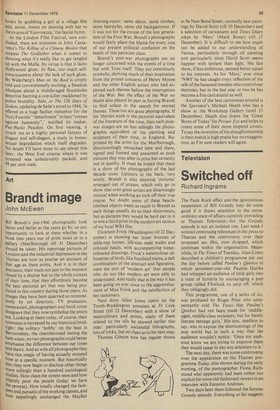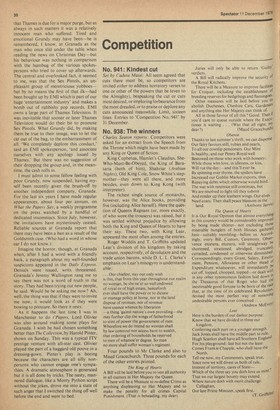Switched off
Richard Ingrams
The Punk Rock affair and the ignominious suspension of Bill Grundy may do some good if it draws attention to the extraordinary state of affairs currently prevailing at Thames Television—for the Grundy episode is not an isolated one. Last week I noticed continuing references in the press to Thames and the controversy over their proposed sex film, now dropped, which continues within the organisation. Meanwhile, in The Times of Tuesday, Alan Coren described a children's programme put out the day before called Pauline's Quirkes in which seventeen-year-old Pauline Quirke had whipped an audience of little girls into a state of hysteria by encouraging a pop group called Flintlock to strip off, which they obligingly did.
This programme, one of a series of six, was produced by Roger Price who unrepentantly told The Times that Pauline's Quirkes had not been made for 'middleaged, middle-class reviewers, but for barely literate teenage girls.' His aim, needless to say, was to expose the shortcomings of the pop world but in such a way that the audience wouldn't notice: 'Once my audience know we are trying to improve them they would cease to pay any attention to it.'
The next day, there was some controversy over the appearance on the Thames programme Today, also shown during the early evening, of the pornographer Fiona Richmond who apparently had been rather too explicit for some old-fashioned viewers in an interview with Eamonn Andrews.
Two days later there followed the famous Grundy episode. Everything so far suggests that Thames is due for a major purge, but as always in such matters it was a relatively innocent man who suffered. Tired and emotional Grundy may have been—he is remembered, I know, at Granada as the man who once slid under the table when reading the news on Christmas Day—but his behaviour was nothing in comparison with the humbug of the various spokespersons who tried to cover up afterwards. The central and overlooked fact, it seemed to me, was that the Sex Pistols, an unpleasant group of meretricious yobboesbut by no means the first of that ilk—had been bought up by EMI which is part of our huge 'entertainment industry' and makes a bomb out of rubbishy pop records. EMI owns a large part of Thames Television. It was inevitable that sooner or later Thames Television would do their bit to promote Sex Pistols. What Grundy did, by making them be true to their image, was to let the cat out of the bag, to the embarrassment of all. 'We completely deplore this conduct,' said an EMI spokesperson, 'and associate ourselves with any apology issued by Thames.' But there was no suggestion of their dropping the group and, in the meantime, the cash rolls in.
I must admit to some fellow feeling with poor Grundy, now suspended, having myself been recently given the brush-off by another independent company, Granada. For the last six years I have made regular appearances, about four per annum, on What the Papers Say, a weekly programme on the press watched by a handful of dedicated insomniacs. Since July, however, the invitations have mysteriously ceased. Reliable sources at Granada report that there may have been a ban as a result of the Goldsmith case. (Who had a word in whose ear I do not know.) Imagine the horror, though, at Granada when, after I had a word with a friendly hack, a paragraph about my well-founded suspicions appeared in the Daily Express. Denials were issued, writs threatened. Granada's Jeremy Wallington rang me to say there was not a word of truth in the story. They had been trying out new people, he said. Would he be asking me now ? Ah, well, the thing was that if they were to invite me now, it would look as if they were bowing to pressure. So there it rests.
As it happens the last time I was in Manchester to do (Papers, Lord Olivier was also around making some plays for Granada. I wish he had chosen something better than The Collection, by Harold Pinter, shown on Sunday. This was a typical ITV prestige venture with all-star cast. Olivier played the part of a haggard old poove in a dressing-gown. Pinter's play is boring because the characters are all silly nonpersons who cannot engage one's sympathies. A dramatic atmosphere is generated but it is all done by tricks. The nasty, mannered dialogue, like a Monty Python script without the jokes, drove me into a state of such anger that I switched the thing off well before the end and went to bed.



































 Previous page
Previous page